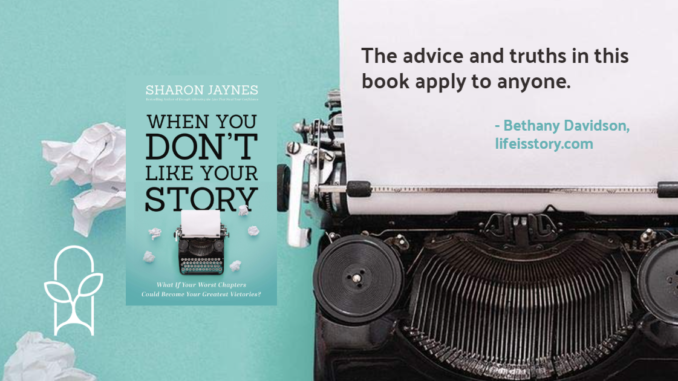
Published by Thomas Nelson on January 26, 2021
Genres: Non-Fiction, Christian Life
Buy on Amazon
Goodreads

Bestselling author, cofounder of Girlfriends in God, and writer for Proverbs 31 Ministries Sharon Jaynes reveals the secret to living a better story: understanding that the worst parts of our past are the very things God uses most.
Many people don't like the story God is writing in their lives. The mistakes, failures, tragedies, and circumstances outside of our control linger in our minds and hold us back. How do we come to grips with the pieces of our stories that we wish weren't there? How do we silence the pain of what has been done to us and the shame of what we've allowed to be done through us?
In When You Don't Like Your Story, Bible teacher Sharon Jaynes shows us how God untangles our most painful emotions with the fingers of grace, putting his redemption on display. In the hardest parts of our narratives, we get to see God's greatest work--and this changes the ending of our stories. As we overcome shame, offer forgiveness, and use our stories to help others, we find freedom from the past and learn to live in the restoration of the present.
At the beginning of When You Don’t Like Your Story, Sharon Jaynes shares her personal story, showing how she overcame shame over her dysfunctional childhood household and came to see that God could use her difficult circumstances for good. She shares a variety of other stories throughout the book, from friends, acquaintances, and women she has met while speaking at conferences. The stories cover a number of different themes and types of losses, and even though many of the stories near the beginning have happy endings, as the book continues, she shares testimonies from people were able to persevere, forgive, and find healing even when their stories did not conclude well. She encourages her readers to see God’s redemptive hand in all of their sufferings, and shares practical steps for how women can overcome shame, make peace with their difficult experiences, and share their story with others.
Jaynes writes in a smooth and compelling style, weaving together Scripture verses, biblical narratives, women’s testimonies, and insight into overcoming shame. When I read this, I was celebrating the fifth anniversary of the week when I first talked about my mental health issues with a friend and experienced freedom and peace in integrating all of my experiences into one story, instead of separating my public life and my private torment. Because of this, I noticed that Jaynes did not include any testimonies related to women overcoming mental health issues. I think that it would have been helpful for her to include stories about mental issues, to normalize and de-stigmatize this aspect of life, but a reader can still apply all of her teaching to whatever situation they are walking through.
However, I do want to provide a trigger warning for people who have experienced sexual abuse. Several women’s stories in this book involve sexual trauma, and even though Jaynes does not include any graphic details about the abuse, she provides specific, sensory details related to the people and environments involved. These stories could trigger other victims, but because Jaynes takes the ravages of abuse very seriously and provides survivors’ wisdom for recovery, this book can also help women heal and break past the shame of what someone did to them. Whether or not someone would find this helpful or hindering would depend on their mental state and how prepared they are to read multiple trauma narratives.
When You Don’t Like Your Story: What If Your Worst Chapters Could Become Your Greatest Victories? is full of excellent advice for Christians who want to see God’s redemptive hand in their lives, move past shame, and speak up about their experiences. Also, even though it is specifically geared towards a female audience, the advice and truths in this book apply to anyone, and men may appreciate this as well, given its strong biblical base and insight into the healing process. This is a very wise and encouraging book, and at the end, Jaynes shares brief lesson plans for each chapter, assigning additional Scripture readings and asking reflection questions. This book is great for someone to read by themselves, but might have the most impact in a group, where people can work through the material together and begin to share their stories. This book is realistic, honest, and encouraging, and can help readers cast away their chains, feel forgiven, move past what was done to them, and find healing in Christ.
